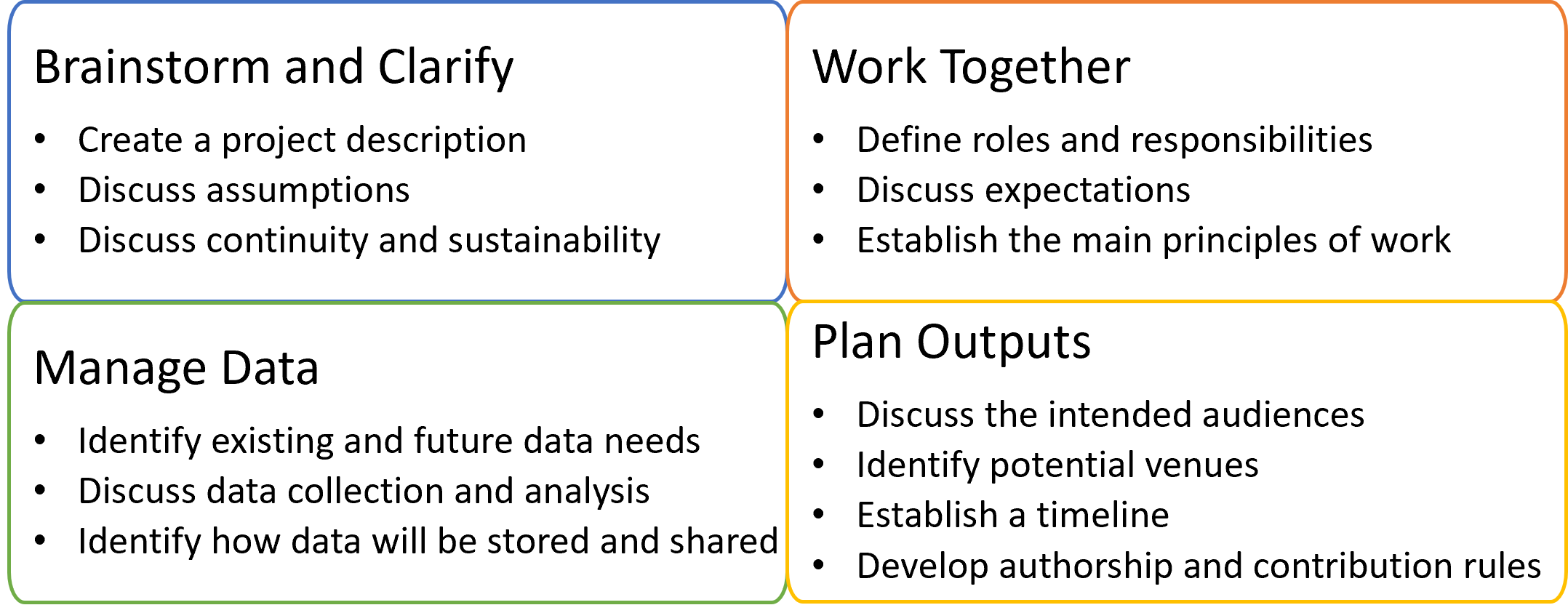Chapter 2 Implementing a Charter for Interdisciplinary and Collaborative Research Projects
2.1 Introduction
A project charter documents the project’s scope, guiding principles, objectives, and roles and responsibilities. Creating and implementing a charter helps to optimize resources for the project and ensure the high quality of data and other outputs generated in the course of the project. For interdisciplinary and highly collaborative research (IHCR) a charter helps to create a shared understanding of the project and align diverse backgrounds and expectations. It can also act as an ethical guide to ensure proper credit and attribution and to resolve conflicts.
Charters are meant to be living documents that evolve with the project and the team’s needs. They need to be written collaboratively and revised regularly. Drafting a project charter can facilitate important conversations early in the project to mitigate conflict or misunderstandings. It can also be a useful tool for onboarding new team members.
The charter workflow below is organized into four broad sections: Brainstorm and Clarify, Work Together, Manage Data, Plan Outputs. After going through the steps of this workflow, the project team should have a good draft of the project charter to discuss and finalize.
2.3 Detailed Steps
2.3.1 Brainstorm and Clarify
Get together as a team and create a concise description of your project and its vision. Clarify the “why’s” and “what’s” of the project and make sure that the team has a shared understanding of the goals and scope of the project.
Discuss assumptions and pre-existing conditions, e.g., funding and constraints, support from informal campus partners, and disciplinary differences.
Discuss project continuity and sustainability. Will the project continue beyond its initial timeline? How will you deal with turnover of project members? What happens if a team member moves institutions?
Suggested activities:
- Create an “elevator pitch” for your project.
- Identify the project’s strengths, weaknesses, and constraints.
- Discuss best case and worst case scenarios for project results.
- Create a team-generated glossary of terms.
2.3.2 Work Together
Understand your team and what each part of the project depends on. Does the project include students, external consultants, volunteers? What are the roles of everyone on the project?
Discuss expectations and modes of communication for your team, including any project management tools you will use, frequency of meetings, and expectations for response times, including communication outside of regular meetings.
Establish the main principles that will guide the work of your team. Possible topics to cover include:
- Values (e.g., good faith and respect, openness and honesty)
- Governance (how decisions are made and how to resolve conflicts and disagreements)
- Recognizing diverse labor contributions
- Open and transparent research
- Diversity, equity, inclusion, & access
Suggested activities:
- Review available communication channels and resources.
- Discuss conflict resolution techniques.
- Discuss how to balance disciplinary perspectives with the project’s goals.
2.3.3 Manage Data
Identify the data you already have, secondary data you plan to use, and data you need to collect.
Discuss methods of data gathering and analysis, especially if methods come from different disciplines. Does the team have the necessary skills? Which tools will be needed? Does everyone in the team have access to those tools?
Identify how data will be stored, organized, and shared. Discuss backup procedures.
Establish rules for archiving or preservation of research data post-project, compliance with funding agencies, and embargo rules.
Suggested activities:
- Create a data management plan.
- Develop a data catalog.
- Establish procedures for documenting metadata (describing your data).
2.3.4 Plan Outputs
Discuss the intended audiences for this research and the impact of research on various fields on team members’ careers.
Identify potential venues and forms of publications, e.g., papers, presentations, datasets, and other research outputs. Discuss how interdisciplinarity affects the choice of venues and publications.
Sketch out a timeline with major milestones and deadlines. Be sure to include any funding or publication/conference deadlines. List major tasks towards the project deliverables. These might align with the research lifecycle and could include things like: acquire equipment, train students on data collection, etc. If possible, indicate responsible team members. These should be high level tasks. You may also discuss how you will adjust for unexpected delays.
Develop rules for authorship and attribution. IHCR projects involve many actors at different levels. Make sure that all team members get credit for their work and identify which contributions merit author recognition on papers and presentation. Other considerations include decisions regarding authorship order, creating a project website with a comprehensive list of team members, and how disagreements will be resolved (especially, in the cases of a power imbalance).
Suggested activities:
- Select a project management approach (e.g., a tracking spreadsheet, external tools such as Trello.com, etc.)
- Review contributor roles taxonomy (e.g., https://credit.niso.org/) and discuss how these roles apply to your project.
2.4 Charter Template
- Project title
- Project description (3-5 paragraphs)
- Elevator pitch (1 paragraph)
- Team members and their roles
- Project principles and values
- Infrastructure
- Communication tools
- Storage
- Analysis software
- Deliverables and due dates
2.5 Resources and Examples
Indiana University Institute for Digital Arts & Humanities Project Charter Template
Center for Digital Humanities Princeton Project Charters
Budak, N., Rustow, M., Koeser, R. S., Doroudian, G., Ermolaev, N., Luescher, S., & Richman, R. (2020). CDH Project Charter – Princeton Geniza Project 2020-2021. Center for Digital Humanities at Princeton. https://doi.org/10.5281/zenodo.4081714
Ruecker, S., & Radzikowska, M. (2008). The iterative design of a project charter for interdisciplinary research. Proceedings of the 7th ACM Conference on Designing Interactive Systems, 288–294. https://doi.org/10.1145/1394445.1394476
